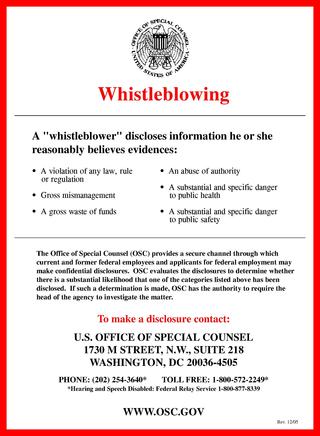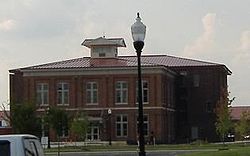Campaign finance laws in the United States have been a contentious political issue since the early days of the union. The most recent major federal law affecting campaign finance was the Bipartisan Campaign Reform Act (BCRA) of 2002, also known as "McCain-Feingold". Key provisions of the law prohibited unregulated contributions to national political parties and limited the use of corporate and union money to fund ads discussing political issues within 60 days of a general election or 30 days of a primary election; However, provisions of BCRA limiting corporate and union expenditures for issue advertising were overturned by the Supreme Court in Federal Election Commission v. Wisconsin Right to Life.

An Official Secrets Act (OSA) is legislation that provides for the protection of state secrets and official information, mainly related to national security but in unrevised form can include all information held by government bodies.
The Federal Election Campaign Act of 1971 is the primary United States federal law regulating political campaign fundraising and spending. The law originally focused on creating limits for campaign spending on communication media, adding additional penalties to the criminal code for election law violations, and imposing disclosure requirements for federal political campaigns. The Act was signed into law by President Richard Nixon on February 7, 1972.

Frank J. Olivo was alderman of the 13th ward of the City of Chicago.
The Conflict of Interest and Ethics Commissioner of Canada is an entity of the Parliament of Canada. The commissioner is an independent officer of Parliament, who administers the Conflict of Interest Act and the Conflict of Interest Code for Members of the House of Commons and is supported in this role by the Office of the Conflict of Interest and Ethics Commissioner. The position came into effect on July 9, 2007, with the coming into force of the Conflict of Interest Act. This act, in turn, was enacted as part of the Federal Accountability Act.

The Washington State Public Disclosure Commission (PDC) is an agency of the Washington state government that regulates candidates, campaigns and lobbyists. It enforces the state's disclosure and campaign finances laws, and provides public access to information about lobbying activities, the financial affairs of elected and appointed public officials, and campaign contributions and expenditures.

Amendment 41 is a citizen initiative adopted by Colorado voters in the 2006 general election. Amendment 41 has three main sections.
Robert L. Waiz Jr is a politician of Jeffersonville, Indiana. He works in real estate and has been on the city council and served as mayor. Waiz, a Democrat, was first elected mayor in 2003, defeating two-term incumbent Tom Galligan in the May Democratic primary and then defeating Republican Monty Snelling in the November general election. On May 8, 2007, he lost the Democrat primary against Galligan; who went on to win the general election in November 2007. Rob Waiz was the youngest mayor elected in the city's modern history.

The Texas Ethics Commission was established in 1991 to oversee and provide guidance on various public ethics laws within the state of Texas. The agency's main office is located on the 10th Floor of the Sam Houston State Office Building at 201 East 14th Street in Downtown Austin.
Thomas R. Galligan is a former three-term mayor of Jeffersonville, Indiana, United States, serving from 1996 to 2003 and again from 2008 to 2011. Galligan succeeded incumbent Raymond Parker Jr. in the 1995 mayoral election and was unseated by challenger, Rob Waiz, during the 2003 election. Galligan defeated Waiz during the 2007 election and was defeated by Clark County Commissioner, Mike Moore, during the 2011 election.
Hunter v. Erickson, 393 U.S. 385 (1969), was a United States Supreme Court case.

A whistleblower is a person who exposes any kind of information or activity that is deemed illegal, unethical, or not correct within an organization that is either private or public. The Whistleblower Protection Act was made into federal law in the United States in 1989.
McIntyre v. Ohio Elections Commission, 514 U.S. 334 (1995), is a case in which the Supreme Court of the United States held that an Ohio statute prohibiting anonymous campaign literature is unconstitutional because it violates the First Amendment to the U.S. Constitution, which protects the freedom of speech. In a 7–2 decision authored by Justice John Paul Stevens, the Court found that the First Amendment protects the decision of an author to remain anonymous.

Gun laws in Indiana regulate the sale, possession, and use of firearms and ammunition in the U.S. state of Indiana. Laws and regulations are subject to change.

The Stop Trading on Congressional Knowledge (STOCK) Act of 2012 is an Act of Congress designed to combat insider trading. It was signed into law by President Barack Obama on April 4, 2012. The law prohibits the use of non-public information for private profit, including insider trading by members of Congress and other government employees. It confirms changes to the Commodity Exchange Act, specifies reporting intervals for financial transactions.

The American Anti-Corruption Act (AACA), sometimes shortened to Anti-Corruption Act, is a piece of model legislation designed to limit the influence of money in American politics by overhauling lobbying, transparency, and campaign finance laws. It was crafted in 2011 "by former Federal Election Commission chairman Trevor Potter in consultation with dozens of strategists, democracy reform leaders and constitutional attorneys from across the political spectrum," and is supported by reform organizations such as Represent.Us, which advocate for the passage of local, state, and federal laws modeled after the AACA. It is designed to limit or outlaw practices perceived to be major contributors to political corruption.

Municipal elections were held in San Diego in 2016 for mayor, city attorney, city council, and ballot measures. The primary election was held on Tuesday, June 7, 2016, and the general election was held on Tuesday, November 8, 2016. Five of the nine council seats were contested. Two city council incumbents ran for reelection.
The Florida Commission on Ethics, created in 1974 by the Florida Legislature, is tasked with investigating complaints alleging breaches of public trust by public officers and employees in Florida, other than judges. It is headquartered in Tallahassee, Florida.










